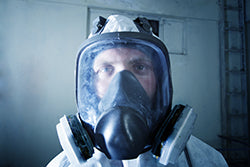Practice: the Ultimate Preparedness Principle
The Principle of Practice

Many of us who are devoted to preparedness do a great job of building the necessary supplies needed to survive nearly any disaster.
 Others are great at learning new self-reliant skills, giving them a leg up in the face of any potential crisis.
Others are great at learning new self-reliant skills, giving them a leg up in the face of any potential crisis.
Even more are great at mapping out a plan for when the stuff really hits the fan.
But how many of us actually practice these plans we worked so hard to put in place?
I know I could use a little more practice.
 Last week, I was doing a mental accounting of where I had hidden one of my backup food caches on my property.
Last week, I was doing a mental accounting of where I had hidden one of my backup food caches on my property.
For the life of me, I couldn't remember.
Luckily, I did remember where the map was hidden.
So, what if I had lost the map? Or couldn't get to it in a crisis?
It was then that I realized a little practice might have prevented my little lapse of memory - a brain fart as my grandpappy would call it.
Since then, I've made an effort to do "trial runs" of various scenarios with my family. I've found out some things in the process I think you'll find helpful. More on that in just a moment.
For those still unconvinced, I thought it might be pertinent at this moment to mention a couple patriots who've come before us who truly believed in the principle of practice.
The "Forgotten" Signers
On this Independence Day weekend, I want to recognize a few of the forgotten signers of the Declaration of Independence.
In total, 56 men signed their names on this founding document. Most of us know that Thomas Jefferson penned the words. The document ends with:
"And for the support of this Declaration, with a firm reliance on the protection of Divine Providence, we mutually pledge to each other our Lives, our Fortunes, and our sacred Honor."
Many of those men who are merely remembered for their signatures paid for our freedom with both their lives and their fortunes.
In essence, the Declaration of Independence served as a "trial run" for the consequences that would come from it.
 Thomas Nelson
Thomas Nelson
One particularly notable "forgotten" signer, Thomas Nelson of Virginia, personally turned cannons on his own home, which British General Cornwallis was using as his headquarters. He made good on his pledge of sacrifice. He made doubly good on his signature, funding the Continental Congress with over $2 million in loans, then dying in poverty.
Each decision Thomas Nelson made served as practice for even further challenges to preserve the principles he believed in.
Rick Rescorla
Rick Rescorla, though not a founding father, is a true patriot that deserves recognition for his commitment to planning - and practice above all. If you're not familiar, check out our full story on Rick by clicking here. Rick was "the man who saw it coming."
On September 11, 2001, Rick helped more than 2,500 Morgan Stanley employees to safety. A major reason he was able to do that? By drilling the employees on evacuation procedures, despite their reluctance to participate. Preparedness is nothing without practice. Practice saves lives.
Create a "go" word or phrase to launch your action plan. Decide on a phrase or word that serves as a code amongst your loved ones that it is time to get into crisis mode.
This makes it easy to get past any confusion about what might be happening in the moment. Confusion can become panic. Panic makes you freeze, which could mean the difference between life and death. So have a "go" phrase or code to signal your family it's serious.
Keep it simple and easy to understand. Ideas I like: "The stuff has hit the fan," or "The albatross has landed."
The only consideration is that there should be no "crying wolf" unless you all know you are practicing your plan.
Practice for Different Scenarios
The more versatile situations you can work into your plan, the better. But, you still have to practice for many contingencies.
Practice for:
- Weather emergencies specific for your region
- Short-term power outages
- Biological/chemical warfare and epidemics
- Nuclear warfare
- Financial collapse / no access to cash or credit
- Civil unrest
 If you know you're not prepared for some of these items, that's OK. But if you do want to become better prepared, make sure you add practicing for the challenges each situation might present.
If you know you're not prepared for some of these items, that's OK. But if you do want to become better prepared, make sure you add practicing for the challenges each situation might present.
For example, in a biological warfare situation, you might want to practice getting gas masks on. Or in an epidemic outbreak, creating a sanitary environment in your home for survival.
Finally, practice with a purpose.
That purpose should be education. You want to assess any needs in your plan that you haven't addressed.
The key is not to get discouraged, knowing that preparedness is a lifelong journey. Remember that and all your practice will be infinitely valuable.
Have a great holiday weekend folks - and remember to practice! It's what our nation's heroes would want us to do.

In Liberty,
Grant Miller, Preparedness Advisor

